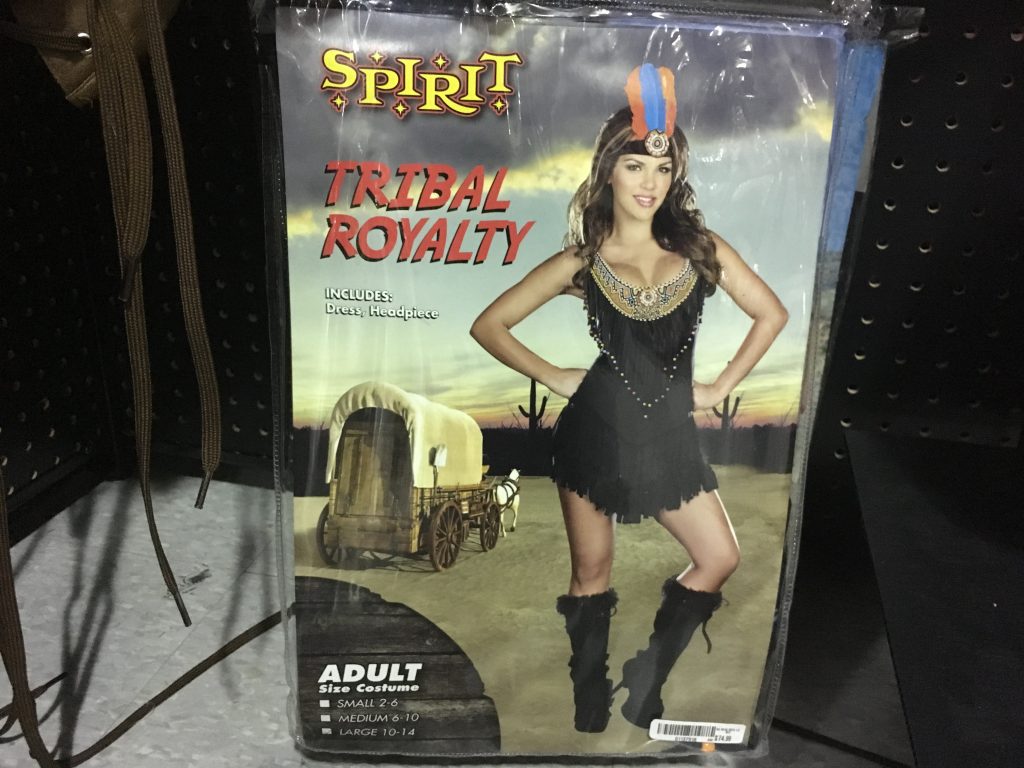More Halloween costume sellers steering clear of cultural appropriation
By Hannah Berge
Trick-or-treaters and Halloween partyers are once again on the hunt for the perfect getup, but this year fewer stores are offering “culture-appropriated” costumes.
This haunting season marks the first time some retailers have stopped selling “Native” costumes, though others are still keeping them in stock despite complaints from Indigenous people and others that they are inappropriate.
Earlier this month, Walmart Canada pulled a number of controversial costumes from its website after complaints about cultural insensitivity. A company official told CBC in Toronto that Walmart would be taking a “harder look” at its retail policies around Halloween costumes.
In response to the Toronto controversy, Chief R. Stacey Laforme of the Mississaugas of the New Credit First Nation told CBC that “race-based costumes, such as the ones sold by Walmart, perpetuate stereotypes of Indigenous people; generalize distinct nations; disregard the deep personal and cultural significance of our traditional clothing; and attempt to devalue our people by sexualizing Indigenous women and likening us to common Halloween customs.”
For Malabar Costumes, a privately-owned company based in Toronto and Ottawa, 2017 is the first year it has officially stopped selling such outfits. Customer complaints over the years and a general public awareness surrounding the issue led up to this change, said a company spokesperson.
Shayla Duval, Malabar Costumes’ administrator, said she understands how these types of costumes perpetuate negative stereotypes about Indigenous cultures.
“The Native ones promote the idea that Native American People are some kind of mythological, historical thing, and this isn’t a present-day issue,” she said. “I think it draws away from the ways in which current harm is being done to those populations.”
However, some stores are still selling such costumes.
Spirit Halloween, a North American franchise store, has been selling costumes since 1983, and has a seasonal store in Ottawa. The Halloween shop sells a variety of “Native” costumes and accessories for men, women and children, and said it has no plan of pulling them from shelves.
“While we respect the opinion of those who are opposed to the sale of any cultural or historical costumes… We continue to offer this broad assortment of costumes,” said Erin Springer, spokesperson for Spirit Halloween.
The store “celebrates and appreciates” different cultures, said Springer.
Carleton University student Cindi Hendrick, an Anishinaabe woman, said she wouldn’t mind stores selling Indigenous costumes if they were a more accurate reflection of real First Nation cultures.
“A lot of my family members find it extremely offensive, simply because they either portray us as savages or American Natives,” she said.
Hendrick said she wishes people would learn the history of what has actually happened with Indigenous people in this country. She said if people better understood the history, and portrayed her culture accurately, she would have no problem with costumes.
“I don’t think people would get offended,” she said.

